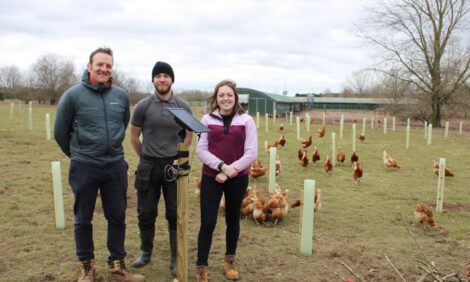



Zoetis secures $15.3 mln to advance sustainable livestock production in Sub-Saharan Africa
The company renewed co-funding with the Bill & Melinda Gates FoundationZoetis announced that it is the recipient a $15.3-million grant from the Bill & Melinda Gates Foundation that will be used to further develop and integrate innovative solutions to advance veterinary care and diagnostic services that will ultimately improve livestock health and productivity in Sub-Saharan Africa.
According to a company press release, the grant will help Zoetis to expand its original African Livestock Productivity and Health Advancement (A.L.P.H.A.) initiative to include aquaculture in addition to cattle, poultry, and swine in an additional seven countries in Sub-Saharan Africa. Part of the company’s Driven to Care long-term sustainability commitments, the new five-year African Livestock Productivity and Health Advancement Plus (A.L.P.H.A. Plus) initiative aims to improve veterinary health and food security in some of the most rapidly developing regions in the world.
This new funding, part of the ‘Innovative Animal Health Models for Small-Scale Producers’ grant, will accelerate access to veterinary products, services and diagnostic tools to increase the productivity of smallholder farms, with a particular focus on supporting female farmers.
“We are grateful for the grant from the Bill & Melinda Gates Foundation as we live our purpose to nurture our world and humankind by advancing care for animals in Sub-Saharan Africa, expanding our work to drive greater impact," said Kristin Peck, chief executive officer of Zoetis. "The combination of Zoetis’ leadership in animal health and experience in forging broad collaborations in emerging markets will allow us to accelerate the advancement of animal health in the region."
“Access to medicines and technology will help farmers raise healthier animals, improve productivity and secure more sustainable revenue, which is critical to the economic development and well-being of the region and its population," Peck continued.
A.L.P.H.A. Plus will focus on dairy and beef production, poultry and aquaculture in Ethiopia, Nigeria, Tanzania, Uganda, and now extend to include Kenya, Ivory Coast and five additional markets from East, West and Central Sub-Saharan Africa.
Drawing on the success of the company’s first A.L.P.H.A. initiative, which began in 2017 in Uganda, Nigeria, and Ethiopia, and later expanded into Tanzania, the new grant will seek to further animal health and farmers’ livelihoods through enhanced training – with a target to train 100,000 stakeholders by 2025. There will be a strong focus on gender diversity, including women-led, female-only training courses optimally designed to maximize attendance. The grant will also enable Zoetis to further develop distribution and training models for ‘last mile’ networks, build disease diagnostic services through laboratory networks in cooperation with public and private local partners, as well as develop outcomes research and digital services.
Expanding and improving access to veterinary medicines, vaccines and services are essential for animal health, nutrition, and an inclusive, sustainable economy – and therefore a key pillar of the initiative.
As one of the most rapidly developing regions in the world, Sub-Saharan Africa is also home to some of the largest livestock populations in the world, and the highest density of impoverished livestock farmers.z Livestock are an essential asset to rural communities, and consequently animal health is critical to achieving food security in areas of exceptionally high animal and human disease incidence.
Through A.L.P.H.A. Plus, co-funded by Zoetis and the Bill & Melinda Gates Foundation, Zoetis will collaborate with governmental authorities, local veterinary associations, national and international NGOs, farmer associations and the public and private sector to maximize its positive impact in the region.
Over the course of the five-year program, Zoetis will build on the progress and key learnings from the initial A.L.P.H.A. initiative, to deliver a long-term sustainable business model and animal health infrastructure for livestock farmers in the wider Sub-Saharan Africa region.










